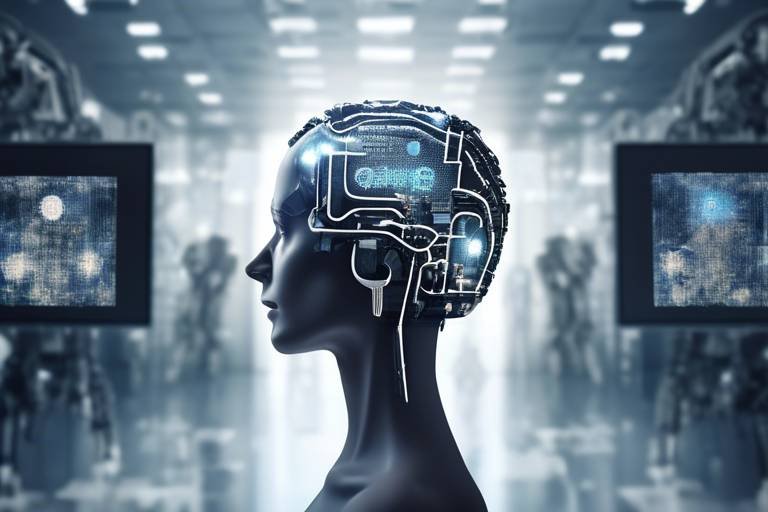The Impact of Artificial Intelligence on Decision Making
Artificial Intelligence (AI) is not just a buzzword; it’s a transformative force reshaping how decisions are made across various sectors. Imagine having a super-intelligent assistant that can sift through mountains of data in seconds, drawing insights that would take humans hours, if not days, to uncover. This is the reality we are stepping into, where AI enhances efficiency, accuracy, and strategic outcomes in both personal and professional contexts. From businesses to healthcare, the influence of AI is profound, making decision-making not only faster but also more reliable.
In the business world, companies are increasingly integrating AI technologies into their operations. This shift allows organizations to make data-driven decisions that significantly enhance productivity and profitability. Think of AI as a crystal ball that helps predict market trends and consumer behavior, reducing the chances of human error and bias. For instance, AI algorithms can analyze customer data to determine buying patterns, enabling businesses to tailor their marketing strategies accordingly. The result? A more engaged customer base and increased sales.
But it’s not just businesses that benefit. In healthcare, AI is revolutionizing decision-making processes by supporting clinicians with data analysis, predicting patient outcomes, and recommending optimal treatment plans. This technology doesn’t just improve patient care; it also streamlines operations in medical facilities. Imagine a world where doctors can focus more on patient interaction while AI handles the heavy lifting of data crunching. Predictive analytics powered by AI helps healthcare providers anticipate patient needs, optimize resource allocation, and tailor treatment plans based on individual patient data.
As we delve deeper into the role of AI in decision-making, it becomes clear that the technology is not merely a tool but a partner in strategic planning. By analyzing vast amounts of data quickly, AI can provide insights that inform everything from product development to customer service strategies. Companies are leveraging AI for tasks such as:
- Market Analysis: Understanding trends and consumer preferences.
- Resource Allocation: Optimizing staffing and inventory.
- Risk Assessment: Evaluating potential challenges and opportunities.
These capabilities enable businesses to operate more efficiently and make informed decisions that drive growth.
In the realm of healthcare, the stakes are even higher. AI technologies are being used to analyze patient data, predict outcomes, and recommend treatments. This not only enhances the quality of care provided but also improves operational efficiency in medical facilities. For instance, AI can help identify patients at risk of developing certain conditions, allowing for early intervention. This proactive approach can lead to better health outcomes and reduced costs for healthcare providers.
Predictive analytics powered by AI is a game-changer in medicine. By analyzing historical data, AI can forecast patient needs, helping healthcare providers optimize resource allocation and tailor treatment plans based on individual patient data. This means that patients receive personalized care that is tailored specifically to their needs, improving overall satisfaction and outcomes. It’s like having a personal health coach that knows you inside out!
Several healthcare institutions have successfully implemented AI solutions, showcasing significant improvements in patient outcomes and operational efficiency. For example, a hospital that adopted AI-driven diagnostic tools reported a 30% increase in diagnostic accuracy and a 25% reduction in patient wait times. These case studies illustrate the potential of AI to transform healthcare decision-making.
However, it’s not all smooth sailing. Despite the benefits, healthcare organizations face challenges in adopting AI technologies. Issues such as data privacy concerns, integration with existing systems, and the need for staff training can hinder progress. It’s crucial for institutions to address these challenges head-on to fully leverage the power of AI in decision-making.
The financial sector is another area where AI is making waves. Financial institutions leverage AI for risk assessment, fraud detection, and investment strategies. This results in more informed and timely financial decisions that enhance security and profitability. Imagine being able to detect fraudulent activity in real-time, preventing significant losses before they occur. That’s the power of AI!
As AI systems take on greater decision-making roles, ethical concerns arise regarding transparency, accountability, and the potential for bias in automated processes. It’s essential to ensure that these systems operate fairly and justly.
One major concern is that AI algorithms can inadvertently perpetuate biases present in training data. This can lead to unfair outcomes in decisions related to hiring, lending, and law enforcement. It’s crucial for developers to be vigilant about the data used to train AI systems to prevent these biases from influencing critical decisions.
Ensuring transparency in AI decision-making processes is crucial for accountability. Stakeholders need to understand how decisions are made and be able to challenge unfair outcomes. This is where regulation and ethical standards come into play, guiding the responsible use of AI technologies.
Looking ahead, advancements in AI technology promise to further revolutionize decision-making practices. With increased automation, improved algorithms, and enhanced human-AI collaboration, the future landscape of decision-making is set to change dramatically. We may soon find ourselves in a world where AI not only assists in decision-making but also collaborates with human experts to achieve unprecedented results.
- What is AI's role in decision-making? AI enhances decision-making by providing data-driven insights and predictions.
- How does AI improve healthcare? AI analyzes patient data to predict outcomes and recommend treatments, improving care quality.
- What are the ethical concerns surrounding AI? Key concerns include bias in algorithms and the need for transparency in decision-making processes.

The Role of AI in Business Decisions
Artificial Intelligence (AI) is not just a buzzword; it’s a game-changer in the world of business. Imagine having a tool that can sift through mountains of data in seconds, uncovering insights that would take humans days, if not weeks, to find. This is the power of AI. By integrating AI technologies into their operations, companies are transforming how they make decisions, leading to enhanced productivity and profitability. The traditional decision-making processes, often marred by human biases and errors, are being replaced by data-driven strategies that are not only faster but also more accurate.
One of the most significant advantages of AI in business is its ability to analyze vast amounts of data quickly. For instance, AI algorithms can identify patterns and trends that might go unnoticed by human analysts. This capability allows businesses to make informed choices based on real-time data rather than relying on gut feelings or outdated information. Imagine a retail company that uses AI to predict customer buying behavior; it can stock up on popular items before they fly off the shelves, thereby maximizing sales and minimizing waste.
Furthermore, AI can enhance decision-making in various sectors, such as marketing, finance, and operations. For example, in marketing, AI can segment customers based on their buying habits and preferences, enabling personalized marketing strategies that resonate with individual consumers. In finance, AI tools can analyze market trends and assess risks, allowing investment firms to make smarter, more timely decisions. The operational side benefits too, as AI can streamline processes, reduce costs, and improve overall efficiency.
However, it’s essential to recognize that while AI brings numerous benefits, it’s not a one-size-fits-all solution. Companies must carefully consider how to implement AI technologies in a way that aligns with their specific needs and goals. It’s not just about adopting the latest tech; it’s about integrating it into the company culture and ensuring that employees are trained to work alongside these intelligent systems.
To illustrate the impact of AI on business decisions, let’s take a look at a few key areas where AI is making waves:
| Business Area | AI Application | Benefits |
|---|---|---|
| Marketing | Customer segmentation and targeting | Increased engagement and conversion rates |
| Finance | Risk assessment and fraud detection | Enhanced security and reduced losses |
| Operations | Process automation and optimization | Cost savings and improved efficiency |
In conclusion, the role of AI in business decisions is profound and multifaceted. As companies continue to embrace AI technologies, they are not only enhancing their decision-making processes but also setting themselves up for long-term success in an increasingly competitive landscape. The future of business is undoubtedly intertwined with the advancements in AI, and those who adapt will thrive.

AI in Healthcare Decision Making
Artificial Intelligence (AI) is not just a buzzword; it’s a revolutionary force reshaping the landscape of healthcare decision-making. Imagine walking into a hospital where your medical history is analyzed in seconds, allowing doctors to make informed decisions that could save your life. AI technologies are increasingly being integrated into healthcare systems, providing clinicians with powerful tools to enhance patient care and optimize operational efficiency. This transformation is not just about speed; it’s about accuracy and precision in a field where these qualities are paramount.
One of the most significant contributions of AI in healthcare is its ability to analyze vast amounts of patient data quickly. AI algorithms can sift through electronic health records, lab results, and even genetic information to identify patterns that may not be immediately apparent to human eyes. This capability allows healthcare providers to predict patient outcomes more accurately and recommend personalized treatment plans. For instance, a patient with a complex medical history may benefit from a tailored approach that considers all aspects of their health, which AI can facilitate more effectively than traditional methods.
Predictive analytics, powered by AI, is a game-changer in anticipating patient needs and optimizing resource allocation within healthcare facilities. By analyzing historical data, AI can forecast potential health issues before they arise, enabling proactive interventions. For example, if data shows that a particular demographic is at higher risk for a specific condition, healthcare providers can implement targeted screening programs to catch issues early. This not only improves patient outcomes but also reduces the strain on healthcare resources.
To illustrate the impact of predictive analytics, consider the following table that highlights the benefits of AI in healthcare decision-making:
| Benefit | Description |
|---|---|
| Improved Diagnosis | AI can analyze symptoms and medical history to assist in accurate diagnoses. |
| Personalized Treatment | Tailored treatment plans based on individual patient data enhance recovery rates. |
| Resource Optimization | Predictive analytics helps allocate resources where they are most needed. |
| Cost Reduction | Early detection of health issues can significantly reduce treatment costs. |
Several healthcare institutions have successfully implemented AI solutions, showcasing significant improvements in patient outcomes and operational efficiency. For instance, a major hospital network utilized AI algorithms to streamline their emergency room processes. By predicting peak times and patient needs, they were able to reduce wait times by 30% and improve patient satisfaction scores. These real-world examples demonstrate that AI is not just theoretical; it is making tangible differences in healthcare settings.
Despite the numerous benefits, the adoption of AI in healthcare is not without its challenges. Healthcare organizations face several hurdles, including:
- Data Privacy Concerns: With sensitive patient information being analyzed, ensuring data privacy is critical.
- Integration with Existing Systems: Many healthcare facilities struggle to integrate AI with their current technologies.
- Need for Staff Training: Staff must be adequately trained to utilize AI tools effectively, which can be a significant investment.
As we delve deeper into the world of AI in healthcare, it’s crucial to address these challenges while harnessing its full potential. The future of healthcare decision-making is bright, and AI is at the forefront of this transformation.

Predictive Analytics in Medicine
Predictive analytics in medicine is like having a crystal ball that helps healthcare providers foresee patient needs and optimize treatment plans. Imagine a world where doctors can anticipate complications before they occur, allowing for timely interventions that can save lives. This is not just a dream; it's the reality that artificial intelligence (AI) is bringing to the healthcare sector. By analyzing vast amounts of patient data, AI can identify patterns and trends that human eyes might miss, enabling more informed and proactive decision-making.
At the heart of predictive analytics is the ability to harness data from various sources, including electronic health records, genetic information, and even wearable technology. This data is then processed using sophisticated algorithms that can predict outcomes with remarkable accuracy. For instance, AI can analyze a patient's medical history and lifestyle choices to forecast the likelihood of developing chronic conditions, such as diabetes or heart disease. This capability not only aids in early diagnosis but also helps in crafting personalized treatment plans tailored to individual patient profiles.
Let's look at some of the key benefits of predictive analytics in medicine:
- Improved Patient Outcomes: By predicting potential health issues, healthcare providers can take preventive measures, leading to better patient outcomes.
- Resource Optimization: Predictive analytics helps in efficiently allocating resources, ensuring that medical facilities are prepared for patient influxes and can manage their staff accordingly.
- Personalized Treatment Plans: With insights into a patient's unique health data, providers can create more effective and tailored treatment strategies.
Additionally, predictive analytics can streamline the administrative processes within healthcare systems. For example, hospitals can use AI to forecast patient admissions based on historical data, allowing them to manage bed availability and staffing levels more effectively. This not only enhances operational efficiency but also ensures that patients receive timely care without unnecessary delays.
However, while the advantages are compelling, the implementation of predictive analytics is not without its challenges. Data privacy concerns are paramount, as sensitive patient information must be protected from breaches and misuse. Furthermore, integrating AI systems with existing healthcare infrastructures can be complex and costly. Training staff to effectively utilize these advanced tools is another hurdle that healthcare organizations must overcome.
In conclusion, predictive analytics in medicine is revolutionizing the way healthcare providers approach patient care. By leveraging AI to analyze data and predict outcomes, the medical field is moving towards a future where proactive and personalized care becomes the norm rather than the exception. As technology continues to evolve, the potential for predictive analytics to enhance healthcare is boundless, promising a healthier tomorrow for all.
- What is predictive analytics in medicine? Predictive analytics in medicine refers to the use of statistical algorithms and machine learning techniques to analyze historical data and predict future outcomes in patient care.
- How does AI improve patient outcomes? AI improves patient outcomes by enabling healthcare providers to anticipate health issues, allowing for timely interventions and personalized treatment plans.
- What are the challenges of implementing predictive analytics? Challenges include data privacy concerns, integration with existing systems, and the need for staff training to effectively use new technologies.

Case Studies of AI Implementation
In recent years, numerous healthcare institutions have embraced artificial intelligence (AI) to enhance their operational efficiency and improve patient outcomes. One of the most notable examples is the implementation of AI-driven diagnostic tools in hospitals. For instance, the Mount Sinai Health System in New York has integrated AI algorithms to analyze medical imaging data. This technology assists radiologists in detecting abnormalities such as tumors with remarkable accuracy, significantly reducing the time taken to arrive at a diagnosis. As a result, the hospital has reported a 30% increase in diagnostic accuracy and a 20% reduction in patient wait times.
Another compelling case study is the partnership between IBM Watson Health and various medical institutions. Watson’s AI capabilities allow for the analysis of vast amounts of medical literature and patient data, enabling healthcare providers to make informed treatment decisions. In a pilot program at a leading cancer treatment center, Watson was able to recommend personalized treatment plans for patients based on their unique genetic profiles. The center noted a 40% improvement in treatment efficacy when following Watson’s recommendations, showcasing the potential of AI to tailor healthcare solutions.
However, the journey to AI integration is not without its challenges. The Royal Free Hospital in London faced significant hurdles when it attempted to implement an AI system for detecting acute kidney injury. Although the system showed promise, it encountered issues related to data privacy and integration with existing electronic health records. These challenges highlight the importance of addressing both technical and ethical considerations when adopting AI technologies in healthcare settings.
To better understand the impact of these implementations, let’s take a look at a comparative table summarizing the outcomes of AI integration in these case studies:
| Healthcare Institution | AI Technology Used | Reported Outcomes |
|---|---|---|
| Mount Sinai Health System | AI-driven diagnostic tools for imaging | 30% increase in diagnostic accuracy, 20% reduction in wait times |
| IBM Watson Health | Personalized treatment recommendations | 40% improvement in treatment efficacy |
| Royal Free Hospital | AI detection for acute kidney injury | Challenges with data privacy and integration |
These case studies not only illustrate the transformative power of AI in healthcare but also emphasize the need for careful planning and execution to overcome potential obstacles. As more institutions adopt AI technologies, the lessons learned from these examples will be invaluable in shaping future implementations.
Q: How does AI improve decision-making in healthcare?
A: AI enhances decision-making by analyzing large volumes of patient data, predicting outcomes, and providing recommendations that help clinicians make informed choices tailored to individual patient needs.
Q: What are some common challenges faced when implementing AI in healthcare?
A: Common challenges include data privacy concerns, integration with existing systems, and the need for staff training to effectively use AI tools.
Q: Are there ethical concerns related to AI in decision-making?
A: Yes, ethical concerns include the potential for bias in AI algorithms, transparency in decision-making processes, and accountability for outcomes influenced by AI systems.
Q: What future trends can we expect in AI decision-making?
A: Future trends may include increased automation, improved algorithms, and enhanced collaboration between humans and AI, further revolutionizing decision-making practices across various sectors.

Challenges in AI Adoption
The adoption of artificial intelligence (AI) in various sectors, particularly in healthcare, is not without its challenges. While the potential benefits of AI are immense, organizations often face significant hurdles that can impede the smooth integration of these advanced technologies. One major challenge is the data privacy concerns that arise when handling sensitive patient information. With increasing regulations, such as GDPR and HIPAA, organizations must ensure that they comply with legal standards while leveraging AI capabilities. This often requires a fine balance between innovation and adherence to privacy laws.
Another significant hurdle is the integration with existing systems. Many healthcare facilities have legacy systems that may not easily accommodate new AI technologies. This can lead to compatibility issues and increased costs as organizations may need to invest in new infrastructure or software solutions. Moreover, the complexity of existing systems can create resistance among staff who may be hesitant to adopt new tools that they perceive as disruptive to their workflows.
Furthermore, there is a pressing need for staff training and education regarding AI technologies. Many healthcare professionals may not possess the technical skills necessary to effectively utilize AI tools, which can lead to underutilization of these resources. Organizations must invest time and resources into training programs that empower staff to understand and leverage AI effectively. This can be a daunting task, especially in environments where time and resources are already stretched thin.
Lastly, the cost of implementation can be a significant barrier for many organizations. While AI can lead to long-term savings and efficiencies, the upfront investment can be daunting, particularly for smaller institutions. Decision-makers must weigh the potential return on investment against the initial costs, which can sometimes lead to hesitation in pursuing AI initiatives.
In summary, while the promise of AI in enhancing decision-making processes is compelling, organizations must navigate a complex landscape of challenges that include data privacy concerns, integration issues, staff training needs, and the costs associated with implementation. Addressing these challenges head-on is crucial for unlocking the full potential of AI technologies in healthcare and beyond.
- What are the main challenges in adopting AI technologies?
Organizations face data privacy concerns, integration with existing systems, the need for staff training, and the costs of implementation. - How can organizations address data privacy issues when implementing AI?
By ensuring compliance with legal regulations and investing in secure data handling practices, organizations can mitigate privacy risks. - Is training staff on AI necessary?
Yes, training is essential to ensure that staff can effectively utilize AI tools and maximize their potential. - What are the potential costs associated with AI implementation?
Costs can include software and infrastructure investments, as well as expenses related to training and ongoing maintenance.

AI in Financial Decision Making
Artificial Intelligence (AI) is rapidly transforming the financial sector, revolutionizing how decisions are made. Imagine a world where financial analysts have superhuman capabilities, where data is analyzed at lightning speed, and where the risk of human error is minimized. This is not science fiction; it’s the reality of AI in finance today. By leveraging vast amounts of data, AI tools can provide insights that were previously unattainable, enabling businesses and individuals to make more informed financial decisions.
One of the most significant applications of AI in finance is in risk assessment. Financial institutions are now using sophisticated algorithms to evaluate the creditworthiness of potential borrowers. These algorithms analyze not only traditional metrics like credit scores but also alternative data sources such as social media activity and transaction history. This comprehensive approach allows lenders to make better decisions, ultimately reducing the risk of defaults and increasing profitability.
Another area where AI shines is in fraud detection. With the rise of digital transactions, the financial industry faces an increasing threat from fraudsters. AI systems can monitor transactions in real-time, identifying unusual patterns and flagging potentially fraudulent activities. By employing machine learning techniques, these systems continuously improve their detection capabilities, adapting to new fraud tactics as they emerge. This proactive approach not only protects consumers but also saves financial institutions millions of dollars.
Moreover, AI is making waves in investment strategies. Robo-advisors, powered by AI, are now commonplace, offering personalized investment advice based on individual risk tolerance and financial goals. These platforms analyze market trends and historical data to optimize investment portfolios, making it easier for individuals to grow their wealth without the need for a traditional financial advisor. As a result, more people are gaining access to sophisticated investment strategies that were once reserved for the wealthy.
However, while the benefits of AI in financial decision-making are clear, it's essential to acknowledge the challenges that come with it. Data privacy is a significant concern; as financial institutions collect and analyze vast amounts of personal data, they must ensure that this information is protected from breaches. Additionally, there is a growing need for transparency in how AI algorithms make decisions, as stakeholders demand to understand the reasoning behind automated choices.
| Application | Description | Benefits |
|---|---|---|
| Risk Assessment | Evaluating creditworthiness using AI algorithms | Reduced defaults, increased profitability |
| Fraud Detection | Monitoring transactions for unusual patterns | Enhanced security, cost savings |
| Investment Strategies | Personalized advice through robo-advisors | Accessibility, optimized portfolios |
In summary, AI is reshaping financial decision-making by enhancing risk assessment, improving fraud detection, and democratizing investment strategies. As we look to the future, it’s clear that the integration of AI will continue to evolve, providing even greater opportunities for individuals and institutions alike to make smarter financial choices. The key will be to balance innovation with ethical considerations, ensuring that as we harness the power of AI, we do so responsibly and transparently.
- How does AI improve risk assessment in finance?
AI analyzes a wide range of data points, including alternative data sources, to provide a more accurate evaluation of a borrower's creditworthiness. - What role does AI play in fraud detection?
AI monitors transactions in real-time, identifying suspicious activities and adapting to new fraud tactics through machine learning. - Are robo-advisors a good option for investing?
Yes, robo-advisors offer personalized investment strategies at a lower cost, making them accessible to a broader audience. - What are the privacy concerns associated with AI in finance?
As AI systems collect and analyze personal data, there are concerns about data breaches and the need for robust data protection measures. - How can transparency be ensured in AI decision-making?
Financial institutions must provide clear explanations of how AI algorithms function and the factors influencing their decisions.

Ethical Considerations in AI Decision Making
The rapid integration of artificial intelligence (AI) into decision-making processes has sparked a crucial conversation about the ethical implications of these technologies. As AI systems become more prevalent in various sectors, it is vital to address the ethical considerations that accompany their deployment. One of the most pressing issues is the potential for bias in AI algorithms. These algorithms learn from historical data, and if that data reflects existing societal biases, the AI can inadvertently perpetuate those biases in its decision-making processes. For instance, in hiring practices, AI can favor candidates based on biased historical hiring data, which may disadvantage qualified individuals from underrepresented groups.
Another significant ethical concern is transparency. Many AI systems operate as "black boxes," where the decision-making process is not easily understood by humans. This lack of clarity can lead to a situation where stakeholders are unable to comprehend how decisions are made, raising questions about accountability. If an AI system makes a flawed decision, who is responsible? Is it the developers, the data scientists, or the organizations that implement these technologies? Establishing clear lines of accountability is essential for building trust in AI systems.
Moreover, the issue of data privacy cannot be overlooked. AI systems often require vast amounts of data to function effectively, which raises concerns about how that data is collected, stored, and used. Organizations must prioritize the protection of personal information to maintain user trust and comply with regulations. Failure to do so can lead to significant legal repercussions and damage to reputation.
To navigate these ethical challenges, organizations should implement guidelines and frameworks that promote responsible AI use. Some best practices include:
- Conducting regular audits of AI systems to identify and mitigate biases.
- Enhancing transparency by documenting the decision-making processes and making them accessible to stakeholders.
- Engaging in stakeholder dialogue to understand the concerns of those impacted by AI decisions.
- Ensuring compliance with data protection regulations to safeguard user privacy.
By addressing these ethical considerations, organizations can harness the power of AI while minimizing potential harm. The goal should be to create AI systems that are not only efficient and effective but also fair and trustworthy. As we move forward, the dialogue surrounding the ethics of AI will be crucial in shaping a future where technology serves humanity positively and equitably.
Q1: What are the main ethical concerns regarding AI decision-making?
A1: The primary ethical concerns include bias in algorithms, lack of transparency, accountability issues, and data privacy.
Q2: How can organizations ensure their AI systems are ethical?
A2: Organizations can conduct regular audits, enhance transparency, engage stakeholders, and ensure compliance with data protection regulations.
Q3: Why is transparency important in AI?
A3: Transparency is vital for accountability, allowing stakeholders to understand how decisions are made and to challenge unfair outcomes.

Bias in AI Algorithms
Artificial Intelligence (AI) algorithms are often touted as the pinnacle of objective decision-making, but the truth is far more complex. In reality, these algorithms can inadvertently embed and perpetuate biases present in their training data. This phenomenon raises significant questions about fairness and equity in automated decision-making processes. For instance, if an AI system is trained on historical data that reflects societal prejudices, it may replicate those biases in its outputs. This can lead to serious implications, particularly in sensitive areas such as hiring, lending, and law enforcement.
To illustrate this point, consider a hiring algorithm designed to screen job applicants. If the training data includes a disproportionate number of successful candidates from a particular demographic, the algorithm may favor applicants who fit that profile while unfairly disadvantaging others. This not only undermines the integrity of the hiring process but also perpetuates existing inequalities in the workforce.
The implications of biased AI algorithms extend beyond individual cases; they can affect entire communities and industries. For example, in the realm of law enforcement, predictive policing algorithms can disproportionately target minority neighborhoods if they are trained on biased historical crime data. This creates a vicious cycle where certain communities are over-policed, leading to more arrests and further skewed data, which in turn reinforces the algorithm's biases.
To combat these issues, it is essential to implement strategies that promote fairness and transparency in AI systems. Some effective measures include:
- Diverse Training Data: Ensuring that the data used to train AI models is representative of all demographics can help mitigate bias.
- Regular Audits: Conducting audits of AI algorithms to identify and rectify biases can maintain accountability.
- Human Oversight: Incorporating human judgment in critical decision-making processes can provide a necessary check against algorithmic bias.
The challenge of bias in AI algorithms is a pressing issue that demands attention from developers, policymakers, and society at large. As we continue to integrate AI into various aspects of our lives, it is crucial to prioritize the development of fair and unbiased systems. By doing so, we can harness the full potential of AI while ensuring that it serves all individuals equitably.
Q1: What is algorithmic bias?
A1: Algorithmic bias refers to systematic and unfair discrimination that occurs when an AI system produces results that are prejudiced due to erroneous assumptions in the machine learning process.
Q2: How can we prevent bias in AI algorithms?
A2: Preventing bias in AI can be achieved by using diverse training datasets, conducting regular audits of algorithms, and incorporating human oversight in decision-making processes.
Q3: Why is bias in AI a concern?
A3: Bias in AI is concerning because it can lead to unfair outcomes that affect people's lives, particularly in critical areas like hiring, lending, and criminal justice.
Q4: Can AI ever be completely unbiased?
A4: While it is challenging to create completely unbiased AI systems, efforts can be made to minimize bias through careful design, diverse data, and ongoing monitoring.

Transparency and Accountability
In the age of artificial intelligence, transparency and accountability have become buzzwords that resonate deeply within discussions about AI decision-making. As AI systems increasingly take on critical roles in various sectors, understanding how these systems arrive at their conclusions is paramount. Imagine a world where decisions affecting your life are made by a black box, with no insight into the thought process behind them. Frightening, isn’t it? This lack of visibility can lead to mistrust and skepticism among users, making transparency not just a luxury but a necessity.
Transparency in AI involves providing clear information about how algorithms function, the data they use, and the reasoning behind their outputs. This clarity allows stakeholders, including consumers, employees, and regulators, to grasp the mechanisms at play. For instance, if a bank uses AI to determine loan eligibility, customers should have access to information about the criteria the AI considers. This knowledge fosters a sense of trust and allows individuals to challenge decisions they perceive as unfair or biased.
Accountability, on the other hand, refers to the responsibility of organizations and developers to ensure that AI systems operate ethically and justly. When an AI system makes a decision that adversely affects someone, who is to blame? Is it the algorithm, the data, or the developers? Establishing clear lines of accountability is crucial. Organizations must be prepared to explain and justify their AI’s decisions, especially when those decisions have significant consequences. This can be achieved through:
- Documenting the AI development process
- Regular audits of AI systems
- Engaging with stakeholders to gather feedback
Moreover, the integration of ethical frameworks in AI development can guide organizations in creating systems that prioritize fairness and equity. By embedding ethical considerations into the design and deployment of AI, companies can preemptively address potential biases and ensure that their technologies serve all users equitably.
As we look to the future, the call for transparency and accountability in AI decision-making will only grow louder. Organizations that prioritize these values will not only build trust with their users but also set themselves apart in a competitive landscape. The journey toward transparent and accountable AI is ongoing, but it is a path that must be traveled to harness the full potential of this transformative technology.
- What is transparency in AI? Transparency in AI refers to the clarity and openness about how AI systems operate, including their data sources and decision-making processes.
- Why is accountability important in AI? Accountability ensures that organizations take responsibility for the outcomes of their AI systems, fostering trust and ethical use.
- How can organizations ensure transparency? Organizations can ensure transparency by documenting AI processes, conducting audits, and engaging with stakeholders.
- What are the risks of a lack of transparency? A lack of transparency can lead to mistrust, unfair outcomes, and potential legal and ethical issues.

Future Trends in AI Decision Making
As we look toward the future, it's impossible to ignore the transformative potential of artificial intelligence (AI) in decision-making processes. The rapid advancement of AI technologies is not just reshaping how businesses operate; it's also redefining the very essence of decision-making across various sectors. One of the most exciting trends is the increasing automation of decision-making. Imagine a world where AI systems can analyze vast amounts of data in real-time, providing insights and recommendations faster than any human could. This capability will enable organizations to respond to market changes and consumer needs with unprecedented agility.
Moreover, the development of improved algorithms is set to enhance the accuracy and reliability of AI-driven decisions. These algorithms will be able to learn from past decisions, continuously refining their processes and outcomes. For instance, in the financial sector, AI can analyze historical market data to predict future trends, helping investors make more informed choices. This level of sophistication is akin to having a seasoned financial advisor who never sleeps and constantly learns from new data.
Another trend on the horizon is the rise of human-AI collaboration. Rather than replacing human judgment, AI will augment it, allowing for a hybrid approach that leverages the strengths of both machines and humans. This synergy can lead to better outcomes, as AI can handle data-heavy tasks while humans focus on strategic thinking and emotional intelligence. For example, in healthcare, AI can assist doctors by providing data-driven insights, but the final decision on patient care will still rest with the medical professionals, ensuring a compassionate touch in the process.
Furthermore, as AI technologies evolve, we can expect to see an increase in explainable AI. Transparency will be key in building trust among users and stakeholders. People will want to understand how AI systems arrive at their conclusions, especially in critical areas like healthcare and finance. This demand for clarity will push developers to create models that not only perform well but also provide insights into their decision-making processes. In fact, organizations may soon be required to provide documentation explaining the rationale behind AI-driven decisions, much like how a human expert would justify their recommendations.
To summarize, the future of AI in decision-making is bright and full of potential. With advancements in automation, improved algorithms, human-AI collaboration, and a focus on transparency, we are poised to enter a new era where decisions are not only faster and more accurate but also more ethical and understandable. As we embrace these changes, it’s essential to keep an eye on the implications for society, ensuring that AI serves to enhance human capabilities rather than diminish them.
- What is the role of AI in future decision-making?
AI will automate processes, improve decision accuracy, and enhance human judgment through collaboration. - How will transparency in AI affect decision-making?
Transparency will build trust and allow stakeholders to understand AI processes, ensuring accountability. - What challenges might arise with increased AI automation?
Potential challenges include data privacy concerns, the need for regulation, and the risk of over-reliance on technology.
Frequently Asked Questions
- What is the impact of AI on decision-making processes?
AI significantly enhances decision-making by providing data-driven insights that improve accuracy and efficiency. It helps individuals and organizations analyze vast amounts of data quickly, allowing for more informed decisions in both personal and professional contexts.
- How is AI transforming business decisions?
AI technologies are being integrated into business operations, enabling companies to make smarter decisions. By reducing human error and bias, AI helps enhance productivity and profitability, allowing businesses to respond more effectively to market changes.
- What role does AI play in healthcare decision-making?
In healthcare, AI supports clinicians by analyzing patient data, predicting outcomes, and recommending treatments. This leads to improved patient care and operational efficiency, helping medical facilities to optimize their resources and tailor treatment plans to individual patients.
- What are predictive analytics in medicine?
Predictive analytics powered by AI enables healthcare providers to anticipate patient needs and optimize resource allocation. By analyzing individual patient data, healthcare professionals can create personalized treatment plans that enhance patient outcomes.
- What challenges do healthcare organizations face in adopting AI?
Despite the benefits, healthcare organizations encounter several challenges when adopting AI technologies. These include concerns about data privacy, the integration of AI with existing systems, and the necessity for staff training to effectively use these new tools.
- How is AI utilized in the financial sector?
The financial sector leverages AI for various purposes, including risk assessment, fraud detection, and investment strategies. By utilizing AI, financial institutions can make more informed and timely decisions, enhancing both security and profitability.
- What ethical considerations arise with AI decision-making?
As AI systems take on greater decision-making roles, ethical concerns emerge regarding transparency, accountability, and potential biases in automated processes. It is crucial to address these issues to ensure fair and equitable outcomes.
- How can bias in AI algorithms be addressed?
Bias in AI algorithms can be mitigated by ensuring diverse and representative training data. Regular audits and updates to the algorithms can also help identify and correct biases, promoting fairness in decisions related to hiring, lending, and law enforcement.
- Why is transparency important in AI decision-making?
Transparency in AI decision-making processes is essential for accountability. It allows stakeholders to understand how decisions are made and provides a framework for challenging any unfair outcomes that may arise from automated processes.
- What future trends can we expect in AI decision-making?
Looking ahead, we can expect advancements in AI technology to further revolutionize decision-making practices. This includes increased automation, improved algorithms, and enhanced collaboration between humans and AI, shaping a more efficient future.



















